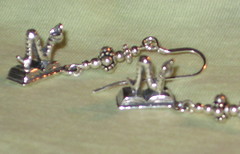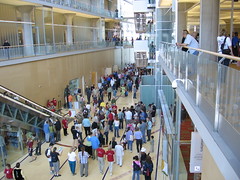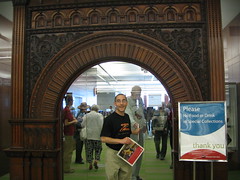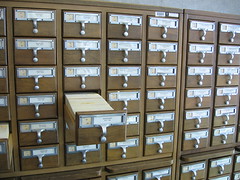I am falling in love with Emerson. Maybe it veers more towards glowing admiration than actual love, but "The American Scholar" made me weak in the knees. I do not wonder why it was received with such enthusiasm when he delivered it as the Phi Beta Kappa address at Harvard in 1837. There is so much quotable material here that you might just want to go read the whole thing yourself.
Emerson believes in the idea of one soul animating all men; the multitude striving to the One; e pluribus unum. But in the address he mourns that "the state of society is one in which the members have suffered amputation from the trunk, and strut about so many walking monsters--a good finger, a neck, a stomach, an elbow, but never a man. Man is thus metamorphosed into a thing, into many things." Emerson sees the function of the scholar as one of reunification. The scholar is to strive to become a Man Thinking rather than a "mere thinker," or worse, a parrot of other's thoughts.
The three main sources of education for the scholar are nature, books, and action.
Nature:
What is nature to him? There is never a beginning, there is never an end, to the inexplicable continuity of this web of God, but always circular power returning into itself. Therein it resembles his own spirit, whose beginning, whose ending, he never can find--so entire, so boundless.
The scholar is to classify nature, to see the connections between and among objects and in so doing, learn the laws of nature which are also the laws of the human mind.
BooksI would not be hurried by any love of system, by any exaggeration of instincts, to underrate the Book. We all know that as the human body can be nourished on any food, though it were boiled grass and the broth of shoes, so the human minds can be fed by any knowledge. And great and heroic men have existed who had almost no other information than by the printed page. I only would say that it needs a strong head to bear that diet
Emerson believes the right use of books is to inspire. All too often the scholar reveres the book itself instead of the truth it contains. Turning a book into a sacred object keeps anyone from questioning the veracity of its contents. We must take from books only what we find to be true, everything else is worthless even if it was written by Plato or Shakespeare.
I am so guilty. I tend to believe books are sacred. But Emerson is right. It is not the object of the book, but what it contains, the ideas and thoughts, that truly matter. But it is also impossible to separate the ideas in the book from the book when censorship rears its ugly head. When Hitler burned books, he wasn't doing it to destroy the books; it was a symbolic act of the destruction of the actual ideas. Now I'm thinking my sensibility of the book as sacred is different than Emerson's. I believe a book's sanctity is based on its representation as a symbol of ideas. The book can exist in any form (think the "living books" at the end of Bradbury's
Fahrenheit 451) as long as it exists. I'm just working this out as I type so there is probably a huge hole in my argument somewhere, but it feels right somehow.
ActionThe preamble of thought, the transition through which it passes from the unconscious to the conscious, is action. Only so much do I know, as I have lived. Instantly we know whose words are loaded with life, and whose not.
Thinking is only half the equation. To be a
Man Thinking requires action. Action and thought feed each other. Thought is nothing unless there is action; action is nothing unless there is thought. Life is raw material; life is a resource; "life is our dictionary."
Once the scholar has attained an education, he has a duty to fulfill: "to cheer, to raise, and to guide men by showing them facts amidst appearances." The scholar is the "world's eye" and the "world's heart." But times are hard. The scholar is scoffed at. The world and people are divided. It is so easy to tread "the old road, accepting the fashions, the education, the religions of society" instead of creating something new. It is easy to be a "bug," or "spawn," easy to be part of "the mass" and "the herd." Or almost as worse, to be a hero or poet, half self-actualized, content to be worshiped by the bugs, spawns, masses, and herds. Greatness and power for its own sake are pointless and destructive for everyone.
Times have not changed much, and I wonder if Emerson's remedy for the ills he saw then is still valid:
If the single man plant himself indomitably on his instincts, and there abide, the huge world will come round to him. Patience--patience; with the shades of all the good and great for company; and for solace the perspective of your own infinite life; and for work the study and the communication of principles, the making those instincts prevalent, the conversion of the world.
Is it patience that is lacking these days, or a critical mass of
People Thinking? I worry that it is the latter.
Next week's Emerson: "An Address"







